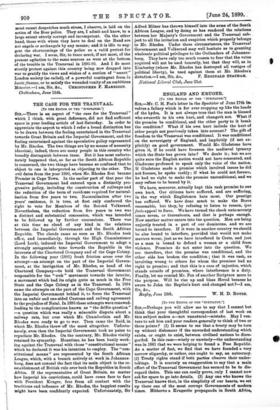THE CASE FOR THE TRANSVAAL. (To THE EDITOR OF THE
"SPECTATOR."] SIR,—There is an aspect of " the case for the Transvaal" which I think, with great deference, did not find sufficient space in your leading article of last Saturday. In order to appreciate the aspect to which I refer a broad distinction has to be drawn between the feeling entertained in the Transvaal towards Great Britain and the Imperial Government, and the feeling entertained against the speculative policy represented by Mr. Rhodes. The two things are by no means of necessity identical; indeed, there are many people in this country who broadly distinguish between them. But it has most unfortu- nately happened that, so far as the South African Republic is concerned, the two things have become so confused that to object to one is interpreted as objecting to the other. The evil dates from the year 1890, when Mr. Rhodes first became Premier in Cape Town. In the earlier part of that year the Transvaal Government had entered upon a distinctly pro- gressive policy, including the construction of railways and the reduction of the term of residence required for natural- isation from five years to two. Naturalisation after two years' residence, it is true, at first only conferred the right to vote for Members of the Second Volksraad. Nevertheless, the reduction from five years to two was a distinct and substantial concession, which was intended to be followed up by further concessions. There was
at this time no cloud of any kind in the relations between the Imperial Government and the South African Republic. The clouds came as soon as Mr. Rhodes took office, and immediately, through the High Commissioner (Lord Loch), induced the Imperial Government to adopt a strongly antagonistic tone towards the Republic in the interests of the Chartered Company and of the Cape Colony. In the following year (1891) fresh friction arose over the attempt—an attempt on the part of the Imperial Govern- ment, at the instigation of Mr. Rhodes, as head of the Chartered Company—to hold the Transvaal Government responsible for the " trek " movement towards the interior, a movement which had its origin quite as much in the Free State and the Cape Colony as in the Transvaal. In 1894 came the attempts on the part of the Cape Government, with the Imperial Government behind it, to force the Transvaal into an unfair and one-sided Customs and railway agreement to the prejudice of Natal. In 1895 these attempts were renewed, leading to the complications known as " the drifts question" —a question which was really a miserable dispute about a railway rate, but over which Mr. Chamberlain and Mr. Rhodes were ready to go to war. Then came the Raid, in which Mr. Rhodes threw off the mask altogether. Unfortu- nately, even then the Imperial Government took no pains to repudiate Mr. Rhodes. On the contrary, Mr. Rhodes visibly retained its sympathy. Meantime, he has been busily work- ing against the Transvaal with those " constitutional means " which he declared it was his intention to employ. The "con- stitutional means " are represented by the South African League, which, with a branch actively at work in Johannes- burg, does not conceal the fact that its main object is the re- establishment of British rule over both the Republics in South Africa. If the representative of Great Britain, no matter how Imperial his convictions, could have come face to face with President Kruger, free from all contact with the traditions and influence of Mr. Rhodes, the happiest results might have been confidently expected. Unfortunately, Sir Alfred Milner has thrown himself into the arms of the South African League, and by doing so has rendered the relations between her Majesty's Government and the Transvaal sub- ject to all the irritation and suspicion which properly belongs to Mr. Rhodes. Under these circumstances, the Transvaal Government and Volksraad may well hesitate as to granting wholesale political privileges to the Outlanders of Johannes- burg. They have only too much reason to fear that the votes acquired will not be used honestly, but that they will, as in Kimberley (where Mr. Rhodes has destroyed all vestiges of political liberty), be used against them at Mr. Rhodes's 1%Tational Liberal Club, June 21st.


















































 Previous page
Previous page